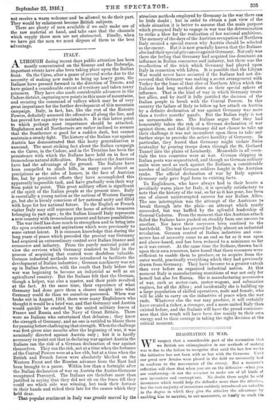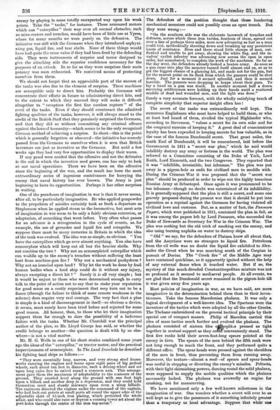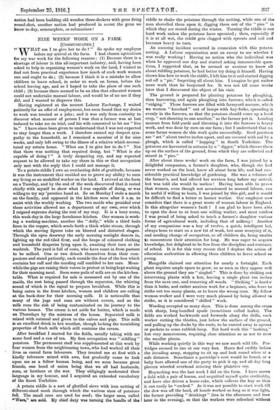IMAGINATION IN WAR.
WE suspect that a considerable part of the accusation that we British are unimaginative in our methods of making war is due to the failure to recognize that until the last few weeks the initiative has not been with us but with the Germans. Until our great new Armies were placed in the field we necessarily had to conform to the movements of the enemy. But a moment's reflection will show that when you are on the defensive—when you are conforming—is not the occasion to make use of all kinds of new inventions and contraptions. No doubt there might be odd inventions which would help the defender more than the attacker, but the vast majority of inventions suddenly introduced are valuable in the degree in which they give the attacker the advantage by enabling him to surprise, -to out-manoeuvre, or locally to crush the
enemy by playing in some totally unexpected way upon his weak points. Take the " tanks," for instance. These armoured motors which can " caterpillar " their way over all normal obstacles, such as mine-craters and trenches, would have been of little use at Ypres, where for many months we were purely on the defensive. The initiative was still with the Germans when they introduced asphyxi- ating gas, liquid fire, and tear shells. None of these things would have had quite the same value if they had been fired by the defending side. They were instruments of surprise and terror designed to give the attacking side the superior confidence necessary for the purposes of an attack. In so far as they were surprises their main potency was soon exhausted. We contrived means of protecting ourselves from them.
We should not forget that an appreciable part of the success of the tanks was also due to the element of surprise. These machines are susceptible only to direct hits. Probably the Germans will concentrate their efforts in future to administering direct hits, and to the extent to which they succeed they will make it difficult altogether to " recapture the first fine careless rapture " of the revel of the tanks. Even if they should counteract the admitted fighting qualities of the tanks, however, it will always stand to the credit of the British Staff that they genuinely surprised the Germans, and that they did so without committing any criminal offence against the kiws of humanity—which seems to be the only recognized German method of achieving a surprise. In short—this is the point which is generally forgotten or obscured—the initiative has scarcely passed from the Germans to ourselves when it is seen that British inventors are just as inventive as the Germans. But until a few weeks ago they had very few opportunities to display their wares.
If any proof were needed that the offensive and not the defensive is the soil in which the inventive seed grows, ono has only to look at our naval operations. There we have been on the offensive since the beginning of the war, and the result has been the most extraordinary series of ingenious contrivances for harrying the enemy that naval history has ever ]mown. The Army is just beginning to have its opportunities. Perhaps it has other surprises in waiting.
One of the paradoxes of imagination in war is that it never seems, after all, to be particularly imaginative. He who applied gunpowder to the propulsion of missiles certainly took as fresh a departure as Stephenson when he applied steam to the locomotive, but most acts of imagination in war seem to be only a fairly obvious extension, or adaptation, of something that went before. Very often what passes for an advance is a retrogression in the cycle of events, as, for example, the use of grenades and liquid fire and catapults. We suppose there must be many nurseries in Britain in which the idea of the tank was evolved. The idea was so simple, so obvious. " You have the caterpillars which go over almost anything. You also have armourplate which will keep out all but the heavier shells. Why not combine the two ? Why not an armourplated caterpillar which can waddle up to the enemy's trenches without suffering the least hurt from machine-gun fire ? Why not a mechanical pachyderm ? Why not an ironclad upon land ? Why let the work be done by frail human bodies when a land ship could do it without any injury, always excepting a direct hit ? " Surely it is all very simple ; but it would be unjust to those who were determined enough to carry talk to the point of action not to say that to stake your reputation for good sense on a costly experiment that may turn out to be a fiasco (through the failure to think of some remote weakness in the scheme) does require very real courage. The very fact that a plan is simple is a kind of discouragement in itself—so obvious a device, it seems, must surely have been tried before and rejected for some good reason. All honour, then, to those who let their imagination support them far enough to dare the possibility of a ludicrous failure with the tanks. Whether Mr. Churchill was the principal author of the plan, as Mr. Lloyd George has said, or whether the credit belongs to another—the question is dealt with by us else- where—is not a vital matter.
Mr. H. G. Wells in one of his short stories combined some years ago the ideas of the " caterpillar," or tractor motor, and the practical imperviousness of armourplate. In The Land Ironclads he described his fighting land ships as follows :— "They were essentially long, narrow, and very strong steel frame- works carrying the engines and borne upon eight pairs of big pedrail wheels, each about ten feet in diameter, each a driving-wheel and set upon long axles free to swivel round a common axis. This arrange- ment gave them the maximum of adaptability to the contours of the ground. They crawled level along the ground with one foot high upon a hillock and another deep in a depression, and they could hold themselves erect and steady sideways upon even a steep hillside. The engineers directed the engines under the command of the captain, who had look-out points at small ports all round the upper edge of the adjustable skirt of 12-inch iron plating, which protected the whole affair, and who could also raise or depress a conning tower set about the port-holes through the centre of the iron top-oover.". The defenders of the position thought that these lumbering mechanical monsters could not possibly cross an open trench. But they were wrong :— "On the southern side was the elaborate lacework of trenches and defences, across which these iron turtles, fourteen of them, spread out over a line of perhaps three miles, were now advancing as fast as a man could trot, methodically shooting down and breaking up any persistent knots of resistance. Here and there stood little clumps of men, out- flanked and unable to get away, showing the white flag, and the in- vaders' cyclist infantry was advancing now across the open in open order, but unmolested, to complete the work of the. machines. So far as the day went, the defenders already looked a beaten army. As soon as a gun came into play the monster turned itself almost end on, so as to get the biggest chance of a glancing hit, and made not for the gun, but for the nearest point on its flank from which the gunners could be shot down. Just for a moment it seemed splendid, and then it seemed horrible. The gunners were dropping in heaps about their guns. To lay a hand on a gun was death. In another moment half a dozen surviving artillerymen were holding up their hands amid a scattered muddle of dead and wounded men, and the fight was done."
Surely a very accurate forecast, with the wholly satisfying touch of complete simplicity that superior insight often has !
The secret of the tanks was extraordinarily well kept. The numerous Englishmen who must have helped to build them, or who at least had heard of them, rivalled the typical Highlander who, according to Stevenson, " values a secret for its own sake and for the congenial exercise of keeping it." A great deal of conscientious loyalty has been expended in keeping secrets far less valuable, as in the case of the famous Dundonald secret. That great sailor, the
tenth Earl of Dundonald, it will be remembered, laid before the Government in 1811 a " secret war plan," which he said would infallibly destroy any army or fortress in the world. The plan was
referred to a Committee consisting of the Duke of York, Lord Keith, Lord Exmouth, and the two Congreves. They reported that it was "infallible, irresistible, but inhuman." The plan was put away in a pigeon-hole as unfit for civilized men to meddle with. During the Crimean War it was proposed that the " secret war plan " should be produced in order to wipe out the highly tenacious Russian Army at Sebastopol. Once again it was pronounced to be too inhuman—though no doubt was entertained of its infallibility. It is generally supposed that the plan is still a secret, and some one gravely proposed during the present war that it should be put into operation as a reprisal against the Germans for having violated all
civilized laws and customs. But, as a matter of fact, the Panmure Papers, which were published in 1911, contained the plan in full, as
it was among the papers left by Lord Panmure, who succeeded the Duke of Newcastle as Secretary for War in the Crimean War. The plan was nothing but the old trick of smoking out the enemy, and also using burning naphtha on water to destroy ships.
" Old " we say, for the defenders of Plataea knew all about that and the Assyrians were no strangers to liquid fire. Petroleum from the oil wells was no doubt the liquid fire exhibited to Alex- ander the Great when he was marching south of the Caspian in pursuit of Darius. The " Greek fire " of the Middle Ages may have contained quicklime, as it apparently ignited without the help of any external flame when it touched water. But if so, the mystery of this much-dreaded Constantinopolitan mixture was not
so profound as it seemed to mediaeval people. At all events, we are glad that the Dundonald secret remained in the pigeon-hole till
it was given away five years ago.
Most policies of imagination in war, as we have said, are more imaginative in the determination behind them than in their inven- tiveness. Take the famous Macedonian phalanx. It was only a logical development of a well-known idea. The Spartans were the inventors of the tactics which were adopted by all the other Greeks. The Thebans embroidered on the general tactical principle by their special use of compact masses. Philip of Macedon carried this idea of mass tactics much further and evolved the phalanx. The
phalanx consisted of sixteen files oplitcs pressed as tight together in mutual support as they co . conveniently stand. The first five ranks held their seven-foot-long spears pointed at the enemy in tiers. The spears of the men behind the fifth rank were not long enough to reach the front, and they performed quite a different office. The spear-heads were pressed against the shoulders
of the men in front, thus preventing them from running away. Moreover, the texture—almost a roof--of spears and spear-heads
was useful in stopping or diverting the enemy's missiles. Peltasts, with their light skirmishing powers, dancing round the solid phalanx, were supposed to supply the mobile qualities which the phalanx necessarily lacked. The phalanx was avowedly an engine for crushing, not for manoeuvring.
We have mentioned only a few well-known milestones in the imagination of war. One wonders whether a secret will ever be so well kept as to give the possessors of it something infinitely greater than a temporary or local advantage. Suppose that while one
nation had been building old wooden three-deckers with guns firing round-shot, another nation had produced in secret the guns we know to-day, armourplate, or submarines !




































 Previous page
Previous page